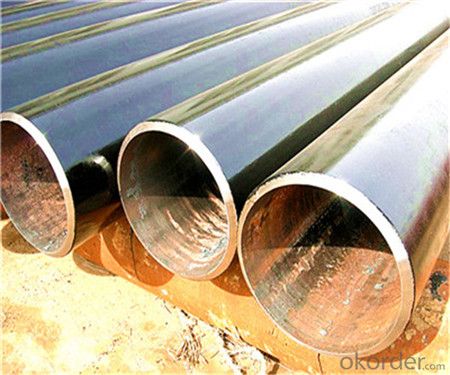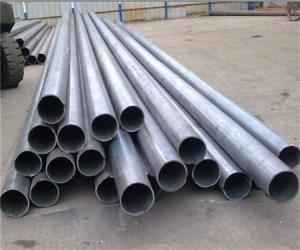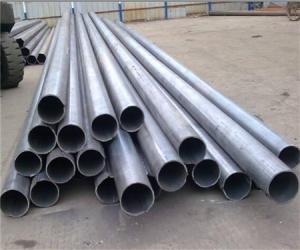ERW Steel Pipe with API 5L, ASTM A53 Standard
- Loading Port:
- Tianjin
- Payment Terms:
- TT or LC
- Min Order Qty:
- 25 m.t.
- Supply Capability:
- 15000 m.t./month
OKorder Service Pledge
OKorder Financial Service
You Might Also Like
1、Structure of ERW Steel Pipe with API 5L, ASTM A53 Standard:
Seamless pipe is formed by drawing a solid billet over a piercing rod to create the hollow shell. As the manufacturing process does not include any welding, seamless pipes are perceived to be stronger and more reliable. Historically seamless pipe was regarded as withstanding pressure better than other types, and was often more easily available than welded pipe.
2、Main Features of ERW Steel Pipe with API 5L, ASTM A53 Standard:
• High manufacturing accuracy
• High strength
• Small inertia resistance
• Strong heat dissipation ability
• Good visual effect
• Reasonable price
3、ERW Steel Pipe with API 5L, ASTM A53 Standard Specification:
Standard | GB, DIN, ASTM ASTM A106-2006, ASTM A53-2007 |
Grade | 10#-45#, 16Mn 10#, 20#, 45#, 16Mn |
Thickness | 8 - 33 mm |
Section Shape | Round |
Outer Diameter | 133 - 219 mm |
Place of Origin | Shandong, China (Mainland) |
Secondary Or Not | Non-secondary |
Application | Hydraulic Pipe |
Technique | Cold Drawn |
Certification | API |
Surface Treatment | factory state or painted black |
Special Pipe | API Pipe |
Alloy Or Not | Non-alloy |
Length | 5-12M |
Outer Diameter | 21.3-610mm |
Grade | 20#, 45#, Q345, API J55, API K55, API L80, API N80, API P110, A53B |
Standard | ASME, ASTM |
1) Material:20#(ASTM A 106/A53 GRB.API5LGRB,GB),45#,16Mn,10#.
2) Specification range:OD:21.3-610mm,WT:6-70mm,length:6-12m or according to the requirement of clients.
3) Excutive standards:GB,ASME API5L.ASTM A 106/A53,Despite of the above standards,we can also supply seamless steel pipe with standard of DIN,JIS,and so on,and also develop new products according to the requirements of our clients!
4) Surface:black lacquered,varnish coating or galvanized.
5) Ends:Beveled or square cut,plastic capped,painted.
6) Packing:bundles wrapped with strong steel strip,seaworthy packing.
4、Packaging & Delivery
Packaging Details: | seaworthy package,bundles wrapped with strong steel strip |
Delivery Detail: | 15-30days after received 30%TT |
5、FAQ of ERW Steel Pipe with API 5L, ASTM A53 Standard:
①How is the quality of your products?
Our products are manufactured strictly according to national and internaional standard, and we take a test
on every pipe before delivered out. If you want see our quality certifications and all kinds of testing report, please just ask us for it.
Guaranteed: If products’ quality don’t accord to discription as we give or the promise before you place order, we promise 100% refund.
②How about price?
Yes, we are factory and be able to give you lowest price below market one, and we have a policy that “ for saving time and absolutely honest business attitude, we quote as lowest as possible for any customer, and discount can be given according to quantity”,if you like bargain and factory price is not low enough as you think, just don’t waste your time.Please trust the quotation we would give you, it is professional one.
③Why should you chose us?
Chose happens because of quality, then price, We can give you both.Additionally, we can also offer professional products inquiry, products knowledge train(for agents), smooth goods delivery, exellent customer solution proposals.Our service formula: good quality+good price+good service=customer’s trust
SGS test is available, customer inspection before shipping is welcome, third party inspection is no problem.
6.Images

- Q:What does "1.5" steel tube mean?
- 1.5 inch [1 1/2 steel pipe, outer diameter 48.3mm, 1.5 inches, refers to the pipe bore is approximately the inner diameter (25.4x1.5 = 38.1mm). [DN40] the specific parameters of the steel pipe are as follows;The average wall thickness is: 3.5mm;The minimum wall thickness is 3.06mm,Nominal diameter is 40mm,External Jing is 48.3mm,
- Q:What connections are there for concrete filled steel tubular column foundations?
- The Liang Duan local widening joint is achieved by the continuous construction of longitudinal steel bars around the steel tube. At the beginning of the creation of additional stirrups should be widened longitudinal reinforced wrap, Liang Duan local widened joints of steel reinforced concrete beam and corbel overlapping transition zone can transmits beam internal force, bending steel bracket in both shear and participation. The node form is used in building engineering in Xiamen. The force transfer path of this joint is clear and reliable, with less welding on site and more convenient for construction. This kind of node passes shear stress through the bracket, and the stress is more concentrated.
- Q:Are steel pipes suitable for semiconductor manufacturing plants?
- Yes, steel pipes are suitable for semiconductor manufacturing plants. Steel pipes offer several advantages such as high strength, durability, and resistance to corrosion, making them ideal for transporting various fluids and gases used in semiconductor manufacturing processes. Additionally, steel pipes can withstand high pressure and extreme temperatures, ensuring the safe and efficient operation of semiconductor manufacturing plants.
- Q:How are steel pipes used in the construction of industrial facilities?
- Steel pipes are commonly used in the construction of industrial facilities for various purposes such as transporting fluids, gases, and steam, as well as providing structural support and carrying electrical wiring. They are durable, resistant to corrosion, and can withstand high pressure and temperature, making them ideal for industrial settings.
- Q:What industries typically use steel pipes?
- Steel pipes are widely used in various industries due to their durability, strength, and versatility. Some of the industries that typically utilize steel pipes include: 1. Construction: Steel pipes are extensively used in the construction industry for various applications such as structural support, plumbing, and underground piping systems. They are commonly used in commercial buildings, residential structures, bridges, and tunnels. 2. Oil and gas: The oil and gas industry heavily relies on steel pipes for drilling, transporting, and distributing oil and gas. Steel pipes are used in offshore drilling rigs, oil refineries, natural gas processing plants, and pipelines to ensure the safe and efficient transport of these valuable resources. 3. Water and wastewater: Steel pipes play a crucial role in providing clean water supply and managing wastewater. They are used in water treatment plants, desalination facilities, and municipal water distribution systems. Steel pipes are also utilized for sewage and stormwater management. 4. Manufacturing: Various manufacturing industries employ steel pipes for specific applications. For instance, automobile manufacturers use steel pipes in exhaust systems, fuel lines, and hydraulic systems. Steel pipes are also used in the manufacturing of machinery, equipment, and appliances. 5. Mining: The mining industry requires strong and durable materials for its operations. Steel pipes are used in mining applications such as conveying materials, ventilation systems, and underground infrastructure. They are particularly useful in transporting minerals, ores, and other mining byproducts. 6. Energy and power: Steel pipes are extensively used in power generation facilities, including thermal power plants, nuclear power plants, and renewable energy installations. They are utilized in steam pipelines, cooling systems, and heat exchangers. Steel pipes are also employed in the construction of transmission lines for electricity distribution. 7. Infrastructure and transportation: Steel pipes are essential for infrastructure development and transportation systems. They are used in the construction of roads, bridges, railways, and airports. Steel pipes are also utilized in the transportation of fluids and gases, such as in pipelines for natural gas or petroleum products. Overall, the versatility and reliability of steel pipes make them indispensable in a wide range of industries, contributing to various aspects of our modern infrastructure and daily lives.
- Q:Can steel pipes be used for conveying gases?
- Yes, steel pipes can be used for conveying gases. Steel pipes are widely used in industrial applications for transporting various gases, including natural gas, propane, and other types of gases. Steel pipes have excellent strength and durability, making them suitable for carrying gases at high pressures and temperatures. Additionally, steel pipes have a high resistance to corrosion, which is crucial when dealing with gases that can be corrosive.
- Q:How are steel pipes used in the construction of railway tracks?
- Steel pipes are commonly used in the construction of railway tracks as they provide a durable and reliable foundation. These pipes are used as support structures for the rails, helping to distribute the weight of the trains and ensure stability. They are also used for drainage purposes, allowing water to flow away from the tracks and preventing damage. Overall, steel pipes play a crucial role in the construction of railway tracks by providing strength, stability, and drainage capabilities.
- Q:How are steel pipes used in the power generation industry?
- Steel pipes are widely used in the power generation industry for various purposes such as transporting fluids, gases, and steam, as well as for structural support and heat exchange. They are used in power plants for conveying cooling water, fuel, and exhaust gases, as well as in boiler systems for transporting high-pressure steam. Additionally, steel pipes are utilized for constructing heat exchangers, condensers, and other critical components, ensuring the efficient and reliable operation of power generation facilities.
- Q:How are steel pipes protected against galvanic corrosion?
- Steel pipes are protected against galvanic corrosion through various methods including the application of protective coatings such as zinc or epoxy, cathodic protection systems, and the use of corrosion inhibitors.
- Q:How are steel pipes used in agriculture?
- Various purposes in agriculture make steel pipes widely used, with one common application being irrigation systems. These pipes, known for their durability and ability to withstand water pressure, transport water from wells or reservoirs to different areas of farms, enabling efficient water distribution over long distances. Furthermore, steel pipes find utility in agricultural drainage systems. By removing excess water from fields, they prevent waterlogging and ensure proper drainage. Their resistance to corrosion is particularly significant in agricultural settings, where exposure to moisture and various chemicals is common. Moreover, steel pipes serve a vital purpose in the construction of greenhouse structures. They provide structural support for the greenhouse framework and facilitate the installation of irrigation systems and other equipment. The strength and sturdiness of steel pipes enable them to withstand harsh weather conditions, making them an ideal choice for greenhouse construction. Additionally, livestock farming benefits from the use of steel pipes. They are frequently employed in the creation of fences and enclosures for animals, providing a secure and long-lasting barrier. Steel pipes also play a crucial role in the construction of animal shelters and barns. To summarize, steel pipes play a crucial and versatile role in agriculture. They are integral components in irrigation systems, drainage systems, greenhouse construction, and livestock farming. Thanks to their durability, strength, and resistance to corrosion, steel pipes are an excellent choice for a wide range of agricultural applications.
1. Manufacturer Overview |
|
|---|---|
| Location | |
| Year Established | |
| Annual Output Value | |
| Main Markets | |
| Company Certifications | |
2. Manufacturer Certificates |
|
|---|---|
| a) Certification Name | |
| Range | |
| Reference | |
| Validity Period | |
3. Manufacturer Capability |
|
|---|---|
| a)Trade Capacity | |
| Nearest Port | |
| Export Percentage | |
| No.of Employees in Trade Department | |
| Language Spoken: | |
| b)Factory Information | |
| Factory Size: | |
| No. of Production Lines | |
| Contract Manufacturing | |
| Product Price Range | |
Send your message to us
ERW Steel Pipe with API 5L, ASTM A53 Standard
- Loading Port:
- Tianjin
- Payment Terms:
- TT or LC
- Min Order Qty:
- 25 m.t.
- Supply Capability:
- 15000 m.t./month
OKorder Service Pledge
OKorder Financial Service
Similar products
New products
Hot products
Related keywords































